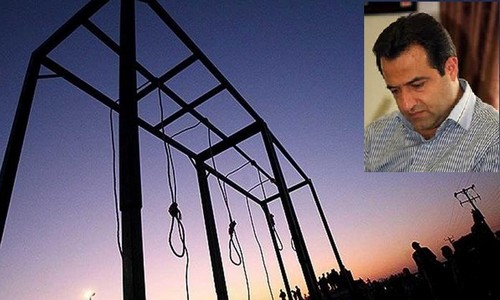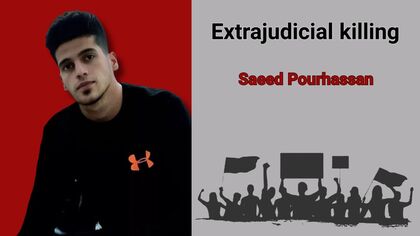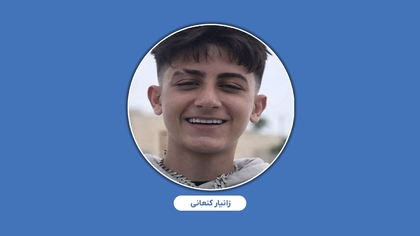Iranian Teacher Abdolreza Ghanbari on the Verge of Execution
19:57 - 18 March 2012

KURDPA - Imprisoned teacher Abdolreza Ghanbari’s pardon request has been denied by the Pardon Commission of Tehran Province Judiciary, a source close to his family told the International Campaign for Human Rights in Iran. With the rejection of his pardon request, once the head of the Judiciary issues his approval, Ghanbari may be executed at any moment.
“On Monday, just before his visit with his family, prison authorities informed him that his pardon request has been refused. Mr. Ghanbari gave this news to his family during their visit. Now they are concerned day and night that Abdolreza’s death sentence may be carried out at any moment,” the source said.
Abdolreza Ghanbari, 44, is a teacher and a resident of the poverty-stricken Pakdasht, near the town of Varamin. He was arrested immediately following the street protests on 27 December 2009 (Ashura Day) at his place of work, and was tried on 30 January 2010 without the knowledge of his family or access to a defense lawyer.
Branch 15 of Tehran Revolutionary Court under Judge Salavati sentenced Ghanbari to death on charges of “moharebeh (enmity with God), through participation in the street gatherings on Ashura Day,” and “contact with enemy groups.” Under Iran’s penal code, moharebeh is meant to criminalize acts of armed action against the government. At his trial, the evidence of his “contact with enemy groups” was presented as “suspicious emails” and “contact with a media outlet outside the country.” On 10 May 2011, Branch 36 of Tehran Appeals Court under Judge Zargar upheld Abdolreza Ghanbari’s death sentence. Ghanbari subsequently submitted a request to the Pardon Commission of Tehran Province Judiciary, which has just been denied.
“His family has written a letter to the head of the Judiciary again, asking for a review, but so far they have not heard back and don’t know what will happen,” the source told the Campaign.
Abdolreza Ghanbari is currently being held in Ward 350 of Evin Prison. He was reportedly beaten during his interrogations and was denied basic rights such as contact with his family and access to a defense lawyer.
“During his trial in the lower court he did not have a lawyer. They took him to court unexpectedly. We hired him a lawyer later, but his lawyer has not been allowed to meet him even once. Abdolreza’s family can only communicate with the authorities through writing letters,” the source said.
Asked about Ghanbari’s physical and psychological conditions, the source said, “Thank God he is well psychologically. He is waiting to see what happens. But his physical conditions are not good. He has developed kidney disease in prison, something he didn’t have before. His family’s letters requesting his transfer to a hospital outside and his treatment have all remained unanswered.”
“On Monday, just before his visit with his family, prison authorities informed him that his pardon request has been refused. Mr. Ghanbari gave this news to his family during their visit. Now they are concerned day and night that Abdolreza’s death sentence may be carried out at any moment,” the source said.
Abdolreza Ghanbari, 44, is a teacher and a resident of the poverty-stricken Pakdasht, near the town of Varamin. He was arrested immediately following the street protests on 27 December 2009 (Ashura Day) at his place of work, and was tried on 30 January 2010 without the knowledge of his family or access to a defense lawyer.
Branch 15 of Tehran Revolutionary Court under Judge Salavati sentenced Ghanbari to death on charges of “moharebeh (enmity with God), through participation in the street gatherings on Ashura Day,” and “contact with enemy groups.” Under Iran’s penal code, moharebeh is meant to criminalize acts of armed action against the government. At his trial, the evidence of his “contact with enemy groups” was presented as “suspicious emails” and “contact with a media outlet outside the country.” On 10 May 2011, Branch 36 of Tehran Appeals Court under Judge Zargar upheld Abdolreza Ghanbari’s death sentence. Ghanbari subsequently submitted a request to the Pardon Commission of Tehran Province Judiciary, which has just been denied.
“His family has written a letter to the head of the Judiciary again, asking for a review, but so far they have not heard back and don’t know what will happen,” the source told the Campaign.
Abdolreza Ghanbari is currently being held in Ward 350 of Evin Prison. He was reportedly beaten during his interrogations and was denied basic rights such as contact with his family and access to a defense lawyer.
“During his trial in the lower court he did not have a lawyer. They took him to court unexpectedly. We hired him a lawyer later, but his lawyer has not been allowed to meet him even once. Abdolreza’s family can only communicate with the authorities through writing letters,” the source said.
Asked about Ghanbari’s physical and psychological conditions, the source said, “Thank God he is well psychologically. He is waiting to see what happens. But his physical conditions are not good. He has developed kidney disease in prison, something he didn’t have before. His family’s letters requesting his transfer to a hospital outside and his treatment have all remained unanswered.”



